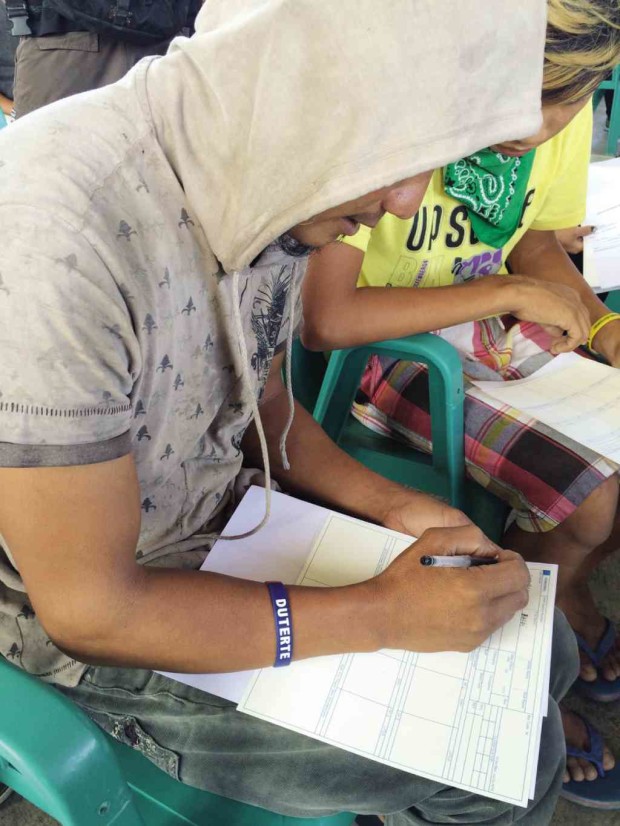Zambo surrenders show growth in drug shadow

A ZAMBOANGA CITY resident wearing a Duterte baller ID signs an information sheet and affidavit of undertaking for surrendered users and pushers. JULIE S. ALIPALA/INQUIRER MINDANAO
ZAMBOANGA CITY—Among at least 800 drug suspects who surrendered recently here, Nuraida Olivadez could be both typical and distinct.
“I am a user,” she said loudly as she faced Chief Supt. Billy Beltran, police chief of Western Mindanao, during a mass surrender of men and women involved in the drug trade in the city.
“I am a pusher,” Olivadez told Beltran.
But Olivadez, who is in her 50s, was quick to add: “This is the only way that I can feed all my nine children.”
Olivadez, along with the dozens of other people suspected of drug involvement and who gave themselves up, were gathered at the covered court of Barangay Labuan. At least 24 of them were women. One of those who surrendered was just 16 years old.
Article continues after this advertisementBeltran said the surrender was both an eye-opener and a shock.
Article continues after this advertisement“A big population in barangays like this (Labuan) is already hooked on drugs,” Beltran said.
“It has gotten worse. The drug menace has spread,” he said.
The reason for the spread of drug addiction, like a disease, could be drawn from the case of Olivadez, who said in an interview with Inquirer that she used to sell vegetables, fruits and fish.
“I walked around this barangay, house-to-house, and go home with P100—an amount that can’t feed nine people. I go home tired and hungry,” she said.
“Selling drugs is easy,” Olivadez said. “Buyers look for you. At the end of the day, you have thousands of pesos in your pockets and you see your children fed and schooled,” she said.
Olivadez raises her children alone. Her husband is in prison after he was arrested in an antidrug operation last year.
All over the city, more than 3,000 people have opted to surrender, subjecting themselves to drug tests, fingerprinting, waiver signing and registration, according to Senior Supt. Debold Sinas, the deputy regional police director for operations.
“When you are tested positive for drug use for the first time, it’s OK,” Sinas said.
“We will not arrest you. You are allowed to go home and heal yourself,” he said.
“The second test, and you are still positive, it’s OK. You are allowed to go home and say goodbye to your family, forever,” Sinas said in jest.
Most of those who surrendered are the poor—tricycle drivers, farmworkers, laborers, and fish and vegetable vendors. They did not include the four policemen and six city hall employees who tested positive for drug use in a recent test.
But Beltran admitted that the police can only document the surrenders because the city does not have a facility or a program to accommodate users and pushers who are willing to submit for rehabilitation.
“In the meantime, we ask them to sign a waiver so we can monitor them as they report to the barangay chair,” he said.
“The next random drug testing and if they are tested positive, we will put them in jail,” he added.
Sinas earlier said 15 percent of the city’s population of 800,000 are either drug users or pushers.
The number of people who surrendered, he said, is equivalent to the consumption of 5 kilograms of shabu (methamphetamine hydrochloride) which, he added, “may be too small.” Julie S. Alipala, Inquirer Mindanao